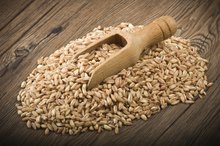What does fact checked mean?
At Healthfully, we strive to deliver objective content that is accurate and up-to-date. Our team periodically reviews articles in order to ensure content quality. The sources cited below consist of evidence from peer-reviewed journals, prominent medical organizations, academic associations, and government data.
- Harvard School of Public Health: Healthy Eating Plate and Healthy Eating Pyramid
- Journal of the American College of Nutrition: Acute Effect of Oatmeal on Subjective Measures of Appetite and Satiety Compared to a Ready-to-Eat Breakfast Cereal: A Randomized Crossover Trial
- Journal of the American College of Nutrition: Acute Effect of Oatmeal on Subjective Measures of Appetite and Satiety Compared to a Ready-to-Eat Breakfast Cereal: A Randomized Crossover Trial
- Nutrition Journal: A Randomized 3x3 Crossover Study to Evaluate the Effect of Hass Avocado Intake on Post-Ingestive Satiety, Glucose and Insulin Levels, and Subsequent Energy Intake in Overweight Adults
The information contained on this site is for informational purposes only, and should not be used as a substitute for the advice of a professional health care provider. Please check with the appropriate physician regarding health questions and concerns. Although we strive to deliver accurate and up-to-date information, no guarantee to that effect is made.
Benefits of Oatmeal and Avocado
Oatmeal and avocado are two versatile, unprocessed foods that are available year-round in grocery stores. Both are good kitchen staples because they’re reasonably priced, and you can either use them as ingredients in recipes or eat them on their own. They also offer many health benefits. Both foods fit into the Harvard School of Public Health’s Healthy Eating Plate, which was created by nutrition experts and encourages eating unprocessed whole grains and foods with healthy fats 1.
Good for Your Heart
The American Heart Association recommends replacing saturated fats with healthier unsaturated fats to reduce your risk of heart disease. The association includes avocados on its list of foods with better fats because they are a source of monounsaturated fat. It also advises eating more high-fiber whole grains, like oats. Oatmeal is especially high in soluble fiber, which has been shown to reduce levels of bad low-density lipoprotein cholesterol in the blood and is associated with a reduced risk of cardiovascular disease.
- The American Heart Association recommends replacing saturated fats with healthier unsaturated fats to reduce your risk of heart disease.
- The association includes avocados on its list of foods with better fats because they are a source of monounsaturated fat.
Low Glycemic Index
Good Carbs to Eat for Breakfast
Learn More
The glycemic index, or GI, measures how a carbohydrate-containing food raises blood glucose. Individuals with diabetes or insulin resistance can benefit from eating lower-GI foods because they have less of an impact on blood glucose and insulin levels. Because avocados are very low in carbohydrates and high in healthy fats and dietary fiber, they have a very low GI and minimal effect on glucose levels. Even though it's high in carbohydrate, oatmeal is also considered a low-GI food because it’s unprocessed, high in fiber, and raises glucose and insulin levels more slowly than other carbs.
- The glycemic index, or GI, measures how a carbohydrate-containing food raises blood glucose.
- Even though it's high in carbohydrate, oatmeal is also considered a low-GI food because it’s unprocessed, high in fiber, and raises glucose and insulin levels more slowly than other carbs.
High in Nutrients
Avocados and oatmeal also provide many vitamins and minerals. Avocados contribute nearly 20 vitamins, minerals and phytonutrients, including vitamins E and C, folate, iron, potassium, and the antioxidants lutein and beta carotene. Oatmeal is a source of many B vitamins and the minerals iron, manganese, phosphorus and zinc. Whole-grain oatmeal is also a source of many different phytochemicals, which according to the American Institute for Cancer Research have potential anti-cancer benefits 5.
- Avocados and oatmeal also provide many vitamins and minerals.
- Whole-grain oatmeal is also a source of many different phytochemicals, which according to the American Institute for Cancer Research have potential anti-cancer benefits 5.
Helpful for Weight Loss
How Can Oatmeal Help You to Lose Weight?
Learn More
Both oatmeal and avocado provide a feeling of fullness and help control appetite, which may be helpful for anyone looking to lose weight. A study published in "The Journal of the American College of Nutrition" in September 2103 found that eating oatmeal improved appetite control and increased satiety compared to eating the same number of calories from a ready-to-eat cold cereal 6. In another study on avocados, published in the "Nutrition Journal" in November 2013, researchers found that participants who added one-half of an avocado at lunch felt more full and satisfied for several hours afterward.
Related Articles
References
- Harvard School of Public Health: Healthy Eating Plate and Healthy Eating Pyramid
- American Heart Association: Frequently Asked Questions About Fat
- American Diabetes Association: Glycemic Index and Diabetes
- USDA National Nutrient Database: Cereals, Oats, Regular and Quick, Not Fortified, Dry
- American Institute for Cancer Research: Foods That Fight Cancer: Whole Grains
- Journal of the American College of Nutrition: Acute Effect of Oatmeal on Subjective Measures of Appetite and Satiety Compared to a Ready-to-Eat Breakfast Cereal: A Randomized Crossover Trial
- Nutrition Journal: A Randomized 3x3 Crossover Study to Evaluate the Effect of Hass Avocado Intake on Post-Ingestive Satiety, Glucose and Insulin Levels, and Subsequent Energy Intake in Overweight Adults
- Food Labeling: Health Claims; Oats and Coronary Heart Disease. Federal Register. Published January 23, 1997.
- Grundy M, Fardet A, Tosh S, Rich G, Wilde P. Processing of oat: the impact on oat's cholesterol lowering effect. Food Funct. 2018;9(3):1328-1343. doi:10.1039/c7fo02006f
- Tosh S, Chu Y. Systematic review of the effect of processing of whole-grain oat cereals on glycaemic response. British Journal of Nutrition. 2015;114(8):1256-1262. doi:10.1017/s0007114515002895
- Ho HVT, Sievenpiper JL, Zurbau A, et al. The effect of oat β-glucan on LDL-cholesterol, non-HDL-cholesterol, and apoB for CVD risk reduction: a systematic review and meta-analysis of randomised-controlled trials. British Journal of Nutrition. 2016;116(08):1369-1382. doi:10.1017/s000711451600341x.
Writer Bio
Anne Danahy is a Boston-based RD/nutritionist who counsels individuals and groups, and writes about healthy eating for wellness and disease management. She holds a Bachelor of Arts from the University of Notre Dame, and a Master of Science in food and nutrition from Framingham State University in Massachusetts.









